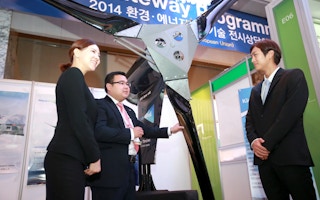Economic development goes hand-in-hand with a heightened demand for energy. As economies in the Association of Southeast Asian Nations (Asean) grow, the region is investing in the sustainability of its development, from managing energy and resource-usage to planning for urban expansion while limiting environmental pressures.
This renewed emphasis on sustainability is reflected in the Asean Plan of Action for Energy Cooperation (APAEC), which aims to raise the proportion of renewable energy used in the Asean region to 15 per cent by 2015.
While policy support for renewables has fallen in other parts of the world, including in the United States, Asean is experiencing record levels of clean technology, or cleantech, investment. Spurred by a burgeoning middle class and the needs arising from sprawling urbanisation – including heightened demand for energy and waste management – the cleantech sector is set to become even more vibrant as opportunities unfold.
In fact, over the next decade, Asean promises to replicate the success witnessed in the rest of Asia, where cleantech firms have reported a combined growth rate of nearly 13 per cent per year from 2005 to 2011, according to the Economist Intelligence Unit.
Eager to tap into this growth potential, 40 small and medium enterprises (SMEs) from across the European Union (EU) will travel to Asean this October to showcase a broad range of clean technologies in a bid to market their products and secure new business partnerships.
As part of the EU’s ‘Business Avenues’ support programme for SMEs, this first business mission will see SMEs from 18 different European countries travel to Singapore and Malaysia from 27 to 31 October.
EU Business Avenues is an initiative that aims to strengthen the presence of European companies in Southeast Asia through week-long business missions to the region. The programme provides strategic, logistic and financial support for European SMEs to gain first-hand experience of local markets and establish business contacts with companies in Asean.
Companies participating in the first business mission will visit the region to present innovative and high technology offerings in a number of sectors, including biogas and biomass, energy conservation and efficiency and solar power generation.
Clean technologies – green, sustainable products, services and processes – encompass a wide range of businesses, including those specialising in renewable energy, energy efficiency, pollution-reduction and recycling.
As established players with proven track records in developing and applying cleantech solutions in both industrial and urban environments, European SMEs have capabilities to work with regional partners further accelerate growth in Asean.
Dr Michael Pulch, EU ambassador to Singapore said, “We have chosen ‘clean technologies’ for this inaugural mission to emphasize how much Singapore – and Asean at large – have advanced both economically and ecologically. There is a growing market here for clean technology solutions”.
Dr Pulch explained that the SMEs that have been selected are amongst the best the EU has to offer in the field of cleantech. This first business mission will put on display a wide range of leading and functional solutions that respond to diverse business needs, including wireless energy management and control systems, advanced materials for construction and green building applications, gas, PV-related modules enhancers and optimisers.
“
We have chosen ‘clean technologies’ for this inaugural mission to emphasize how much Singapore – and Asean at large – have advanced both economically and ecologically. There is a growing market here for clean technology solutions
Dr Michael Pulch, EU ambassador to Singapore
Recognised as a global leader in the environment and cleantech sectors, Singapore is at the forefront of innovation and an early adopter of solutions in the Asean region. This made Singapore an ‘ideal springboard for EU cleantech companies looking to access regional markets’, said Dr Pulch.
The Singapore Government is also strongly involved in the promotion and development of Singapore as a global R&D centre for cleantech and renewable energy, including solar, wind, electric mobility, smart grids, biomass, fuel cells, energy efficiency and carbon related services.
The inaugural mission of the ‘Business Avenues to Southeast Asia’ programme will centre on a two-day bespoke business exhibition held on 28 - 29 October 2014 at the Marina Bay Sands, alongside the Singapore International Energy Week (SIEW).
The SMEs will then travel to Malaysia where a series of business-to-business meetings have been set up with local counterparts at the Hilton Hotel in Kuala Lumpur, on 31 October 2014. Further to these business matching opportunities, the companies from the EU will benefit from sector expert presentations and specific site visits in each country.
About the programme
EU Business Avenues to Southeast Asia seeks to maximise and leverage the dynamic business environment in ASEAN to deliver significant trade and investment opportunities for EU and local players. It aims to promote and strengthen partnerships between European SMEs with unique technology offerings and businesses based in Singapore, Malaysia and the rest of Asean.









